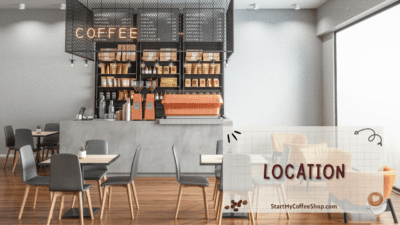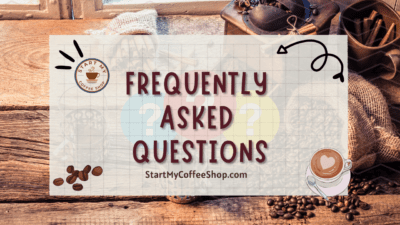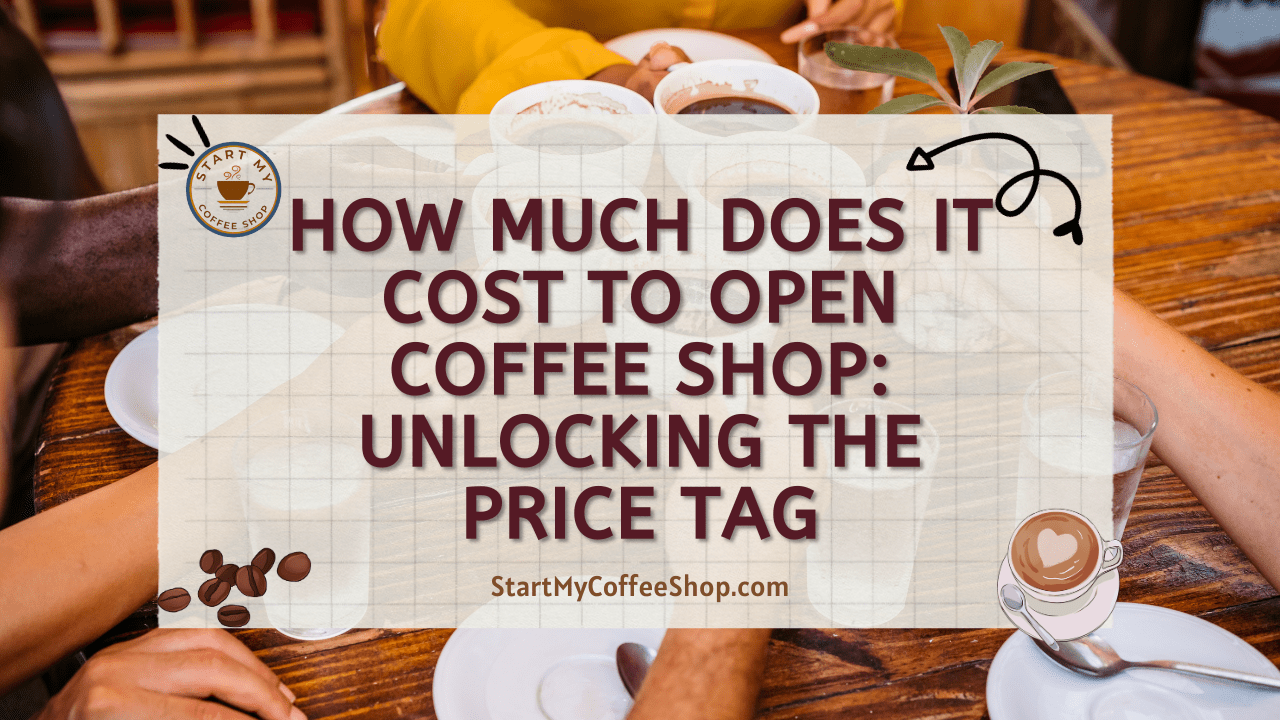Opening a coffee shop is an exciting venture that allows you to share your love for coffee with the community. However, one crucial aspect that aspiring coffee shop owners must consider is the cost involved. From finding the perfect location to investing in equipment and hiring staff must be considered.
Opening a coffee shop involves various expenses such as location, lease/purchase costs, renovations, equipment, licenses, staffing, marketing, and ongoing expenses. Thorough budgeting and planning are essential for estimating the overall cost and ensuring a great venture.
In this article, I will delve into the various factors that contribute to the cost of opening a coffee shop and provide a comprehensive guide to help you plan your budget effectively.
Location: The Foundation of Your Coffee Shop

Foot traffic is a key consideration. You’ll want to position your coffee shop in an area with high pedestrian flow, such as near busy streets, shopping centers, or office complexes. A steady stream of potential customers passing by your establishment increases the likelihood of attracting new patrons and generating consistent revenue.
Visibility is another crucial aspect to assess when selecting a location. A coffee shop with good visibility can catch the attention of passersby and create brand awareness. Being easily noticeable from the street, with attractive signage and appealing window displays, can entice people to step inside and explore what your coffee shop has to offer.
The presence of nearby competition should also be taken into account. While having some competition can be a positive sign of a thriving market, excessive competition nearby might make it challenging to capture a significant share of the customer base. Evaluate the coffee shops or cafes already established in the area and consider how your unique value proposition can differentiate your business and attract customers.
Local demographics are an essential consideration. Understand the characteristics of the community you’ll be serving, including their preferences, habits, and purchasing power. For example, a neighborhood with a young, trendy population might have a higher demand for specialty coffee and a willingness to pay a premium for quality.
While prime locations in bustling areas often come with a higher price tag, they can offer tremendous benefits in terms of customer reach and revenue potential. Higher foot traffic and visibility can lead to increased customer visits and sales. It’s important to carefully evaluate the potential return on investment when considering the cost of securing a prime location. Conducting a thorough market analysis and financial projection can help you weigh the benefits against the expenses and make an informed decision.
Read more about: Cost to Run a Coffee Shop: Caffeine and Cash
Lease or Purchase Costs: Finding the Perfect Space
Leasing a space entails monthly rent payments and often requires a security deposit. The lease terms, including the duration and any potential rent increases, should be thoroughly reviewed before committing. Leasing provides flexibility, allowing you to test the viability of your coffee shop in a particular area before making a long-term commitment.
It also allows you to allocate your initial capital toward other essential aspects of your business, such as equipment and marketing. However, leasing means that you do not gain equity in the property, and you may be subject to rental increases or potential restrictions imposed by the landlord.
On the other hand, purchasing a property involves a substantial upfront investment. While it may require more initial capital, owning the property provides a sense of stability and potential long-term financial benefits. Property ownership allows you to build equity over time, potentially leading to increased value and opportunities for expansion or diversification in the future.
Additionally, you have more control over the space, enabling you to customize and modify it according to your specific needs. However, purchasing a property requires thorough research of local property prices and consideration of factors such as mortgage rates, property taxes, and ongoing maintenance costs.
When making a decision, it’s advisable to research local property prices and consult with real estate professionals who specialize in commercial properties. They can provide insights into market trends, help you identify suitable locations, and guide you through the negotiation and acquisition process. Engaging their expertise can assist you in making an informed decision based on your budget and specific requirements.
Furthermore, consider the potential growth and development of the area. Analyze factors such as population growth, commercial expansion, and future infrastructure projects that may impact property values and the performance of your coffee shop.
Renovations and Interior Design: Creating an Inviting Atmosphere
Renovations often involve structural changes or improvements to the existing space. This could include adjusting the layout, installing new walls or partitions, or making necessary repairs. The extent of renovations required will depend on the condition of the space and the specific vision you have for your coffee shop. Hiring a reputable contractor to assess the space and provide a detailed quote will help you estimate the costs more accurately.
The interior design aspect is essential in creating a cohesive and appealing atmosphere that reflects your brand. This includes selecting decor elements such as color schemes, wall finishes, artwork, and signage.
Furniture, including seating options, tables, and counters, also contributes to the overall aesthetics and functionality of the space. Lighting is another crucial aspect, as it sets the mood and enhances the visual appeal of your coffee shop. Additionally, flooring options, such as tiles, hardwood, or polished concrete, can add character and durability to your space.
The costs for these elements will depend on various factors, including the size of your coffee shop and the quality of materials you choose. Consulting with an interior designer can provide valuable insights and help you create a cohesive design concept that suits your brand identity. They can also assist in sourcing materials and furniture within your budget.
Obtaining quotes from contractors, interior designers, and suppliers is crucial for accurate cost estimation. By comparing different quotes and exploring various options, you can make informed decisions and prioritize your spending based on your budget and desired outcome.
It’s important to strike a balance between creating an appealing ambiance and managing costs effectively. Remember, while investing in renovations and interior design is important, it should align with your target market and provide a comfortable environment for your customers.
Equipment and Supplies: Brewing the Perfect Cup

A well-equipped coffee shop requires various items, including espresso machines, grinders, brewers, refrigeration units, serving utensils, and POS (Point of Sale) systems. It’s essential to conduct thorough research to identify reputable suppliers and consider both the upfront costs and ongoing expenses associated with the equipment.
Espresso machines are the heart of any coffee shop, allowing baristas to create delicious espresso shots. These machines come in a wide range of types and models, each offering different features and capabilities.
It’s crucial to choose a machine that suits your specific needs, taking into account factors such as output capacity, reliability, and ease of use. While high-quality espresso machines can have a significant upfront cost, they are an investment that can contribute to the consistency and quality of your coffee.
Grinders are equally important in the coffee-making process, as they ensure the beans are ground to the desired consistency. Investing in a reliable and precise grinder allows you to extract the full flavor potential from the coffee beans, enhancing the taste and aroma of your beverages.
Brewers are necessary for preparing other coffee options, such as drip coffee or pour-over. Consider the capacity, programmability, and brewing features when selecting a brewer that aligns with your coffee shop’s needs. Refrigeration units are essential for storing milk, cream, and other perishable items. Having reliable refrigeration equipment ensures the freshness and safety of your ingredients.
Serving utensils, such as cups, mugs, spoons, and stirrers, should be of high quality and visually appealing. These items contribute to the overall customer experience and reflect the attention to detail that your coffee shop values.
POS systems are crucial for efficient order processing and payment management. A reliable POS system enables smooth transactions, inventory tracking, and sales reporting. Consider the features, ease of use, and integration capabilities when choosing a POS system that suits your coffee shop’s operations.
Read more about: Cost to Open Up a Coffee Shop: The Financial Considerations
Licenses and Permits: Complying with Regulations
Operating a coffee shop entails obtaining the appropriate licenses and permits, which vary depending on the location in which you plan to establish your business. These licenses and permits are necessary to ensure compliance with local regulations and provide your customers with a safe and sanitary environment. It is essential to research the specific requirements in your area and factor in the associated costs to budget accordingly.
One of the primary licenses you will likely need is a health permit. This permit ensures that your coffee shop meets the necessary health and sanitation standards set by the local health department.
Obtaining a health permit typically involves submitting an application, paying a fee, and undergoing inspections to ensure compliance with food safety regulations. The cost of the health permit can vary depending on the size of your establishment and the specific requirements of your local health department.
Additionally, you may need to obtain food handling certifications for you and your staff. These certifications demonstrate that you have received proper training in food safety and handling practices. Depending on your jurisdiction, this may involve completing a food safety course and passing an exam. The cost of obtaining food handling certifications may include course fees and examination fees.
A business license is another essential requirement for operating a coffee shop. This license grants you the legal authority to conduct business in a specific jurisdiction. The cost of a business license can vary depending on the location and the type of business structure you have chosen, such as sole proprietorship, partnership, or corporation. It is important to research the requirements and fees associated with obtaining a business license in your area.
Signage permits may also be necessary if you plan to display signs or advertisements for your coffee shop. These permits ensure that your signage complies with local regulations regarding size, placement, and content. The cost of signage permits can vary depending on the number and size of signs you plan to display.
When budgeting for licenses and permits, it is important to consider not only the application fees but also any renewal fees that may be required in the future. It is recommended to consult with local authorities or licensing agencies to ensure that you know all the necessary permits and licenses and to obtain accurate information regarding associated costs.
Staffing Costs: Building a Talented Team
Hiring and training competent staff is a critical aspect of running a coffee shop and providing exceptional customer service. When considering your staffing needs, it is important to determine the number of employees required, their roles and responsibilities, and the prevailing wage rates in your area.
Additionally, you must account for costs associated with employee benefits, payroll taxes, and training programs to ensure your staff is well-equipped to handle the demands of a busy coffee shop.
Firstly, assess the number of employees needed based on the size and expected volume of your coffee shop. Consider positions such as baristas, cashiers, kitchen staff, and managerial roles.
Each position has specific responsibilities that contribute to the smooth operation of your coffee shop. Determining the optimal staffing levels is crucial to maintain efficiency and provide excellent customer service.
Next, research the prevailing wage rates in your area to ensure that you can attract and retain qualified staff. Wage rates may vary depending on local cost of living, industry standards, and experience levels. Offering competitive wages is essential for attracting and retaining skilled employees who are dedicated to providing outstanding service.
In addition to wages, you must account for employee benefits and payroll taxes. Employee benefits can include healthcare coverage, retirement plans, paid time off, and other perks that enhance job satisfaction and employee well-being. Payroll taxes, such as Social Security and Medicare contributions, must also be factored into your budget.
Training programs are crucial for equipping your staff with the necessary skills and knowledge to meet the demands of a busy coffee shop. This can include training in coffee preparation, customer service, hygiene and safety protocols, and POS system operation. Investing in comprehensive training programs ensures that your staff can consistently deliver high-quality beverages and provide exceptional customer experiences.
Marketing and Advertising: Spreading the Word

One of the most powerful marketing tools in today’s digital age is social media. Create engaging social media campaigns that showcase your unique offerings, highlight your coffee shop’s ambiance, and share customer testimonials.
Utilize platforms such as Facebook, Instagram, and Twitter to connect with your audience, build a loyal following, and encourage user-generated content. Engaging with your customers online can help create a sense of community and increase brand visibility.
Investing in a professional and user-friendly website is also crucial for promoting your coffee shop. Your website should reflect your brand identity and provide essential information such as location, menu options, and opening hours. Consider incorporating features like online ordering or reservation systems to enhance customer convenience.
Print materials, such as business cards, flyers, and brochures, are effective in targeting local audiences. Distribute these materials in strategic locations such as nearby businesses, community centers, and local events. Collaborate with other businesses in your area to cross-promote and reach a wider customer base.
Additionally, consider hosting or participating in local promotions or events to increase visibility and attract new customers. This could include organizing coffee-tasting events, partnering with local organizations for fundraisers, or offering discounts during specific times or holidays. Collaborate with influencers or local bloggers to generate buzz and reach new audiences.
It’s important to be creative and think outside the box when it comes to marketing your coffee shop. Engage with your target audience through interactive and visually appealing content. Share behind-the-scenes glimpses of your coffee-making process, feature seasonal specials, or create contests to encourage customer participation.
Read more about: Cost to Open Small Coffee Shop: Opening Costs Revealed
Ongoing Expenses: Sustaining Your Coffee Shop
Beyond the initial setup costs, several ongoing expenses are crucial to sustaining a coffee shop business. Understanding and planning for these expenses is vital to ensure long-term growth and profitability.
One significant ongoing expense for a coffee shop is monthly utilities. This includes electricity, water, gas, and internet bills. These utilities are essential for running various equipment, such as coffee machines, refrigerators, and computers. By estimating and budgeting for these expenses, you can avoid surprises and ensure that your coffee shop operates smoothly.
Another ongoing expense is inventory restocking. Coffee beans, milk, syrups, cups, and other supplies need to be regularly replenished to meet customer demands. It’s important to keep track of inventory levels, monitor trends, and establish relationships with reliable suppliers. By managing inventory efficiently, you can minimize waste, prevent stockouts, and control costs.
Equipment maintenance is another essential ongoing expense. Coffee machines, grinders, refrigerators, and other equipment require regular servicing and occasional repairs. Incorporating maintenance costs into your financial plan ensures that your equipment remains in optimal condition, reducing downtime and costly breakdowns.
Employee wages constitute a significant portion of ongoing expenses. Coffee shops typically employ baristas, kitchen staff, and possibly managerial personnel. It’s essential to budget for wages, considering factors like local wage rates, employee benefits, payroll taxes, and potential overtime costs. Investing in well-trained and motivated staff can enhance customer satisfaction and contribute to the overall improvement of your coffee shop.
Marketing initiatives are crucial for attracting and retaining customers. Allocating a portion of your budget to marketing allows you to create brand awareness, engage with your target audience, and promote special offers or events. This may include digital marketing campaigns, social media management, website maintenance, and printed materials. By continuously investing in marketing, you can stay competitive and drive customer loyalty.
Creating a detailed financial plan that accounts for these ongoing expenses is essential. It allows you to track and analyze your cash flow, evaluate profitability, and make informed business decisions. Regularly reviewing your financial performance can help you identify areas of improvement and adjust your strategies accordingly.
Summary
Opening a coffee shop requires careful planning and budgeting to ensure a smooth and great launch. By considering factors such as location, lease or purchase costs, renovations, equipment, licenses, staffing, marketing, and ongoing expenses, you can create a comprehensive budget that aligns with your vision.
Frequently Asked Questions

Q: Do I need any specific qualifications or experience to open a coffee shop?
A: While there are no specific qualifications required, having a passion for coffee, understanding customer service, and basic business knowledge is advantageous.
Q: How can I find the right location for my coffee shop?
A: Finding the right location involves considering factors like foot traffic, nearby competition, demographics, and visibility.
Q: What licenses and permits are necessary to open a coffee shop?
A: The licenses and permits required vary depending on your location, but typically include health permits, business licenses, food handling certifications, and signage permits.
To learn more on how to start your own coffee shop, check out my startup documents here.
Disclaimer: The information provided by StartMyCoffeeShop.com (“The Site”) is for general informational purposes only. All information on the Site is provided in good faith. However, we make no representation or warranty of any kind, express or implied, regarding the accuracy, adequacy, validity, reliability, availability, or completeness of any information on the Site. Under no circumstance shall we have any liability to you for any loss or damage of any kind incurred as a result of the use of the Site or Reliance on any information provided on the Site. Your use of the Site and reliance on any information on the Site is solely at your own risk. This blog post is for educational purposes only and does not constitute legal advice. Please consult a legal expert to address your specific needs. Terms and Conditions. (https://startmycoffeeshop.com/terms-and-conditions/)

Hi! I’m Shawn Chun
My adventure in coffee began when I first launched my first coffee shop back in the early 2000s. I had to figure out so many things on my own and to make it worse within 2 years of opening two large corporate coffee chains moved in just blocks away from me!
As I saw smaller and even some larger coffee shops in the neighborhood slowly lose customers to these giant coffee chains and slowly close up shop, I knew that I had to start getting creative…or go out of business.
I (like you may be) knew the coffee industry well. I could make the best latte art around and the foam on my caps was the fluffiest you have ever seen. I even had the best state-of-the-art 2 group digital Nuova Simonelli machine money could buy. But I knew that these things alone would not be enough to lure customers away from the name brand established coffee shops.
Eventually, through lots of trial and error as well as perseverance and creativity I did find a way to not only survive but also thrive in the coffee/espresso industry even while those corporate coffee chains stayed put. During those years I learned to adapt and always faced new challenges. It was not always easy, however, in the end, I was the sole survivor independent coffee shop within a 10-mile radius of my location. Just two corporate coffee chains and I were left after that year. All told the corporate coffee chains took down over 15 small independent coffee shops and kiosks and I was the last one standing and thriving.
Along the years I meet others with the same passion for coffee and I quickly learned that it is not only “how good a barista is” that makes a coffee shop successful, but the business side of coffee as well.
Hence why I started this website you are on now. To provide the tools and resources for up and coming coffee shop owners to gain that vital insight and knowledge on how to start a coffee shop successfully.
Stick around, browse through my helpful blog and resources and enjoy your stay! With lots of LATTE LOVE!
Shawn







